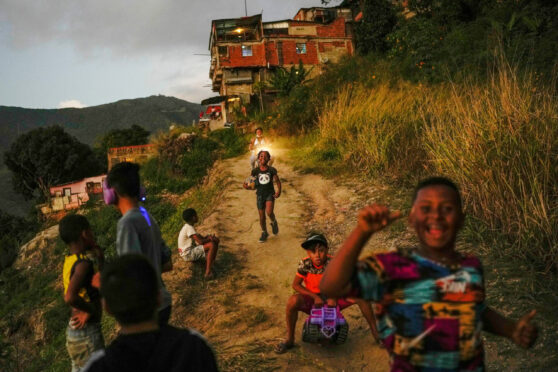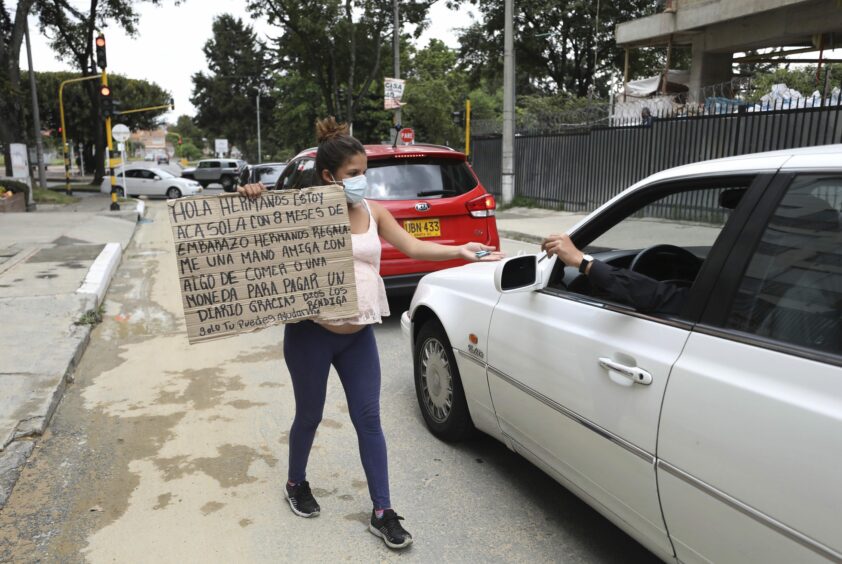
They are the los enchufados – literally “the plugged in” – the Venezuelan elite who drive around in Ferraris or Porches in a country where the economy is on its knees.
At the other end of society are the millions who have to line up for subsidised fuel and food handouts from President Nicolas Maduro.
One of these is Lubin Gonzalez who left his home in Caracas at 7pm one night recently in search of petrol and joined a queue which snaked miles down the road. Thirteen hours later, he returned home with a full tank.
“The queue went on forever and this in a country which was rich in oil but now I am queuing up like thousands of others,” he said.
Oil-rich Venezuela has seen production plunge from 3.23 million barrels per day in 2008 to 540,000 last year and been hit by US sanctions – imposed in response to human rights abuses and its lack of cooperation in combatting terrorism and drug trafficking – which have made selling the country’s main export difficult.
Like millions of others, Gonzalez juggles several jobs to support his wife and three daughters, working as a driver, salesman and shop owner.
“There are people who are worse off but if you are not linked to the government or have money, life is tough,” he said.
By money, of course, he means the US dollar, not the worthless official currency, the bolivar, which has been all but abandoned in a cynical change of course by Venezuela’s socialist government, which still officially regards Washington as its “enemy No. 1”.
After years when inflation soared and US sanctions and gross economic mismanagement shrunk the economy by nearly 80%, many Venezuelans lack the basics.
The UN World Food Programme estimated in 2020 that a third of the country’s population was “food insecure” and needed state help to put enough food on the table.
Venezuela has an official population of about 28 million but some six million are estimated to have left.
The UN Refugee Agency and International Organisation for Migration forecast that by the end of 2022 there would be 8.9 million Venezuelan refugees abroad. The exodus is the second biggest migration crisis in the world, after Syria.
Cristina, who did not want to disclose her real name, moved to Spain in 2017 with her family after her eight-year-old son was kidnapped.
“That was the end for me,” she said. “Imagine this. On Thursday we helped our neighbours negotiate their daughter’s freedom after she was kidnapped. Then on Saturday, we were together again negotiating our son’s kidnap. This was normal,” she remembered.
“They start asking $100,000, then $50,000. Then you end up paying two or three watches, some jewellery, a PlayStation – really – and something around $10,000.”
President Maduro has cracked down on the kidnappers but now a new danger stalks Venezuelans: gangs who hold up motorists.
“They stop you and you pay if you want to pass. Some roads are too dangerous to use,” said Cristina.
Among the Venezuelan refugees in Spain, it is not uncommon to find doctors, classical musicians or other professionals scraping by waiting tables, working in bingo clubs or as delivery riders.
Beatriz Octavio Ariznabarreta, who moved from Venezuela to Spain in 2018, wants to harness this talent.
“I want to create a virtual nation of intelligent, qualified people,” said Octavio, who set up Codigo Venezuela Foundation, a Madrid-based group which helps qualified migrants settle in Spain.
Back home, many Venezuelans depend on remittances sent back by migrants.
In 2019, some $6 million was sent back home by Venezuelans abroad, according to Codigo Venezuela. Quite what proportion of the population survives in this way is unclear.
A report last year by the Inter-American Development Bank said: “Against the backdrop of enormous migratory flows by Venezuelans to other countries and an unprecedented economic crisis that particularly affects the availability of food in Venezuela, remittances sent by immigrants play a fundamental role in the wellbeing of families that receive them.”
Amid the chaos, how does Maduro keep hold of power?
When he took the reins of power in 2013, critics predicted the former bus driver would soon be ousted from the presidential palace.
In 2015, Maduro’s socialist party lost control of the lower house of parliament to the opposition but measures were swiftly brought in to ensure no repeat of this slip.
The Supreme Court was filled with judges loyal to the government. In 2017, the parliament was dissolved and replaced with a rubber-stamp assembly.
Parliament was later re-established but with a socialist majority.
Control of the media has proved key. Private television channels are run by supporters of the president and almost all newspapers were closed down.
Opposition parties only get a sliver of the media attention they should have during elections. Several websites critical of Maduro have been blocked.
Today when he broadcasts on state TV, the president exudes confidence.
Carlos Malamud, an expert on Latin America at the Real Elcano Institute, a Madrid-based thinktank, said: “Saddam Hussein, Fidel Castro and Daniel Ortega stayed in power despite opposition and incompetence.
“Maduro has employed the apparatus of state to repress the population. The opposition is split and people have become resigned. They accept the state handouts.”
However, there are signs the socialist government may be turning the economy around – using classic capitalist measures: eliminating government imposed controls and cutting subsidies on essentials like petrol and restrictions on foreign exchange.
Benjamin Franklin, the image on a US $100 bill, is the face most Venezuelans see when they pay for things, not that of Simon de Bolivar, liberator of Venezuela from the Spanish Empire.
For Gonzalez, 42, even a slight uplift in the economy has come too late.
His father is in a public hospital with a prostate condition but his family had to bring sheets as the hospital lacks even these basic supplies.
“I want to leave Venezuela with my family. I want a better life for them,” he said.

Enjoy the convenience of having The Sunday Post delivered as a digital ePaper straight to your smartphone, tablet or computer.
Subscribe for only £5.49 a month and enjoy all the benefits of the printed paper as a digital replica.
Subscribe © Fernando Vergara/AP/Shutterstock
© Fernando Vergara/AP/Shutterstock